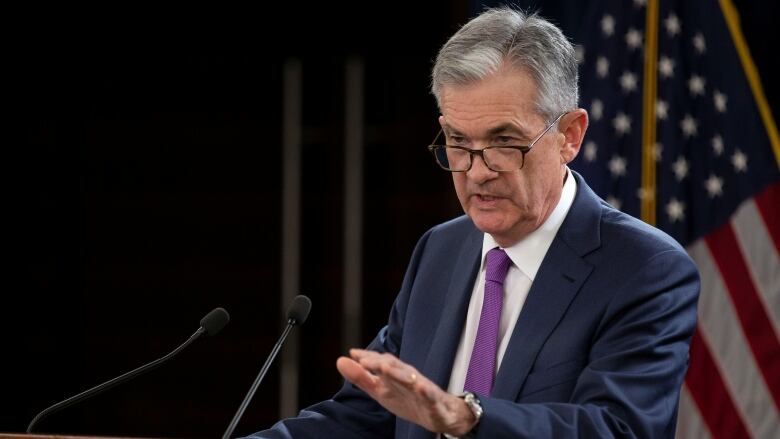Fed chair Powell says central bank will be patient in hiking rates even as economy expands

Federal Reserve Chairman Jerome Powell says the U.S. economy should keep expanding at a solid, though somewhat slower pace this year. But he warns of growing risks, including a global slowdown, volatile financial markets and uncertainty about U.S. trade policy.
In delivering the Fed's semiannual monetary report to Congress, Powell says the Fed will be "patient" in determining when to boost its benchmark policy rate in light of the various "crosscurrents and conflicting signals." He says the Fed's rate decisions will be "data dependent" as the economic outlook evolves.
The Fed in December indicated it could hike rates two times this year. But many private economists believe the Fed will keep rates unchanged until late this year and may not hike at all.
Powell said that the economy grew at a strong pace last year, with employment and inflation remaining close to the Fed's goals. He said it appeared that overall growth was slightly below 3 per cent in 2018. The Fed expects 2019 growth to slow somewhat.
He said that while the 35-day partial government shutdown "created significant hardship for government workers and many others, the negative effects on the economy are expected to be fairly modest and to largely unwind over the next several months."
Uncertainty around China, Brexit
Powell cited a number of factors that could slow growth have emerged in recent months.
"Financial markets became more volatile toward year-end, and financial conditions are now less supportive of growth than they were earlier last year," Powell said.
He noted that growth has slowed in major foreign economies, including China and Europe, and "uncertainty is elevated" around major policy issues such as Brexit, Britain's proposed exit from the European Union, and ongoing U.S. trade negotiations with various countries.
Powell's testimony Tuesday before the Senate Banking Committee will be followed by testimony on Wednesday before the House Financial Services Committee.
Some private analysts are forecasting that the Fed's next move could be a rate cut in 2020 as the central bank confronts a slowing economy.
At its last meeting in January, the Fed left rates unchanged at a level of 2.25 per cent to 2.5 per cent and signalled a major pivot away from steadily raising rates by declaring that it intended to be "patient" in determining when to move rates again.

The Fed's decision triggered a big rally in stock prices as investors grew less concerned that the Fed could over-do its tightening cycle and push the country into a recession.
The Fed raised rates four times in 2018. Its December rate hike, along with a forecast of two more hikes in 2019, sent the market down sharply as investors worried that the central bank was in danger of over-doing its credit tightening and could end up sending the country into a recession.
As the stock market began tumbling last October, U.S. President Donald Trump increased his attacks on the central bank, calling the Fed's rate hikes his biggest threat and saying that the central bank should not be raising rates at all because there was no threat of inflation.
Powell did not want to go anywhere near critical comments his predecessor Janet Yellen made about Trump.
Powell was asked if he agreed with comments Yellen made in a radio interview Monday that she did not believe Trump had a good grasp of economic policy.
He replied to Sen. Sherrod Brown, a Democrat from Ohio, with a terse, "I don't have any comment on that for you, senator."
Earlier this monthTrump invited Powell to what was described as a cordial dinner at the White House.
Labour force participation
Powellsayshe welcomes a solid increase in the past year in the proportion of Americans working or looking for work, but notes that the so-called labour force participation rate remains lower in the United States than most other wealthy nations.
"This is very, very important to us," he says. "We hope it's sustained."
Powell also saysthat the gain impacts Fed policy, which suggests that he sees the extra workers as allowing companies to hire more without paying so much in extra wages that it would spark inflation.
When asked why U.S. labour force participation trails that of other countries, Powell blames a lack of skills and need for workers to gain more education. He also says some workers risk losing more in government benefits than they gain in pay if they take jobs.
Massachusetts Sen. Elizabeth Warren, who is running for the Democratic presidential nomination, called out "child care," a reference to economic research that suggests many women have dropped out of the workforce because of the high cost of child care. Warren has proposed legislation that would provide free, universal child care.












_(720p).jpg)


 OFFICIAL HD MUSIC VIDEO.jpg)
.jpg)



























































































